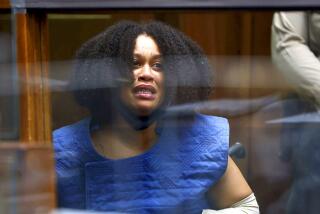Murder or not? Lawyers make final arguments in trial over Adenhart death
- Share via
The trial of Andrew Thomas Gallo in the death of Angels pitcher Nick Adenhart and two friends hinges on a simple question: Did he commit murder?
The way defense attorney Jacqueline Goodman sees it, Gallo, 23, never intended to kill anyone.
Goodman argued during closing arguments Thursday that Gallo didn’t even plan on driving the night he is accused of getting into his parents’ SUV after a night of heavy drinking, then running a red light and colliding with another vehicle. Adenhart, 22; Courtney Stewart, 20; and Henry Pearson, 25, were killed. Jon Wilhite, 24, of Manhattan Beach survived but received major injuries. Gallo’s stepbrother, Raymond Rivera, broke his nose and wrist.
At the time of the crash, Gallo was 22 years old, a recovering alcoholic who had tried twice before to overcome his addiction, Goodman said. He always made sure he had a designated driver, and in the hours before the crash it was Rivera, his designated driver, who pushed him to drink, she said.
When the crash happened, Goodman argued, Gallo and Rivera were so intoxicated that it is possible Rivera was actually the driver. She conceded that it was unlikely and said Gallo didn’t want her to argue the point.
But in the end, she said, even if Gallo was driving, he is not what people have in mind when they think of a murderer. He is a young man with bad judgment who is now caught in a tragic situation.
“Use your common sense,” Goodman said. “Is it murder?”
For prosecutors, the answer is clear. Gallo had been convicted of driving under the influence three years before the April 9, 2009, crash and was still on probation. He had been warned of the dangers of drinking and driving by a court, by friends and by family.
Orange County Deputy Dist. Atty. Susan Price asked the jury to convict Gallo of three counts of second-degree murder, felony DUI and felony hit and run. If convicted on all counts, he faces 55 years to life in prison.
Prosecutors have charged intoxicated drivers with murder for decades — often, but not always, because the driver, like Gallo, had a previous conviction for driving under the influence and was warned of the possible consequences in court.
When Gallo was tested a couple of hours after the crash, he had a blood-alcohol level of 0.19%, more than twice the legal limit for driving. During the trial, Price showed video of Gallo and his stepbrother drinking heavily in a West Covina bikini bar before the crash.
Hours later, Adenhart, who had just made his first start of the season for the Angels and pitched six scoreless innings; Stewart, a former cheerleader at Cal State Fullerton; and Pearson, a 25-year-old law school student who was building a sports management business, were dead.
“Three people are dead,” said Price, her voice rising angrily to fill the courtroom, where the families of three of the victims have sat since the beginning of the trial. “Are we supposed to feel sorry for him in that situation?
“Use your common sense,” Price said. “The defendant carries the entire burden for this crime.... Their death lies squarely at his feet.”
Jurors began deliberating the case Thursday afternoon.
More to Read
Sign up for Essential California
The most important California stories and recommendations in your inbox every morning.
You may occasionally receive promotional content from the Los Angeles Times.














